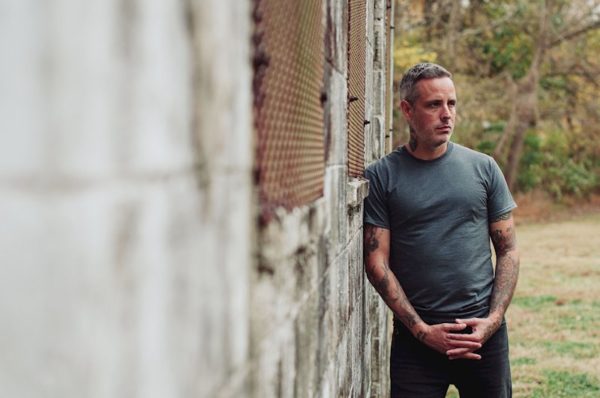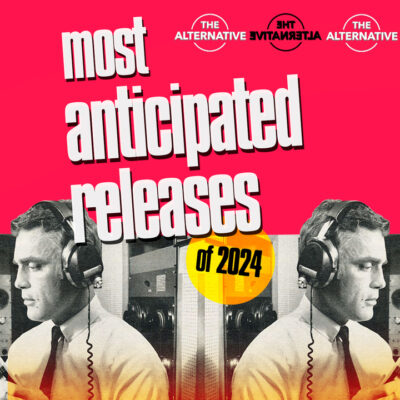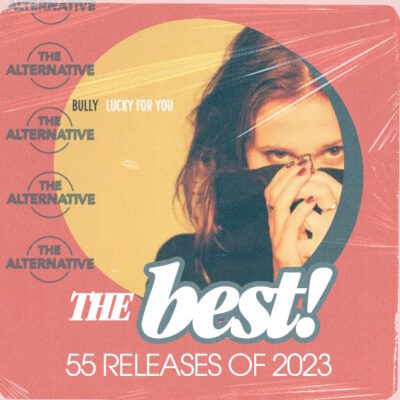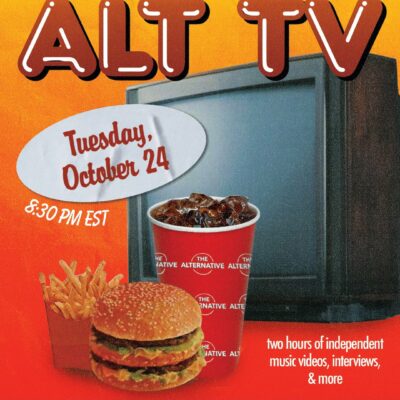Interview: Nathan Gray – Boysetsfire
Posted: by The Editor

Nathan Gray wants you to know he has your back. On his second solo album under his own name, Working Title, he digs deep into inner turmoil to produce life-affirming anthemic punk rock and roll songs that are all about learning to live positively with your pain, rather than masking it with a veneer of faux-happiness. It’s an antidote of sorts to today’s social media-driven influencer culture, where everyone appears to be killing it on social media, despite statistics in the news reminding us that depression and anxiety are paradoxically rampant.
Nathan spoke with us to talk about his music, mental health, and helping others feel less alone.
It seems like a central theme on this record is about coming to terms with past abuse and working to get into a healthier mental state. Did making this record, specifically, help you in that regard?
Oh, without a doubt. It’s easy sometimes to get locked into either having this mask where you’re just happy all the time, or allowing yourself to fall into a slump where you’re depressed and feeling horrible all the time. With this album, I was really able to find a happy medium that is life with those ups and downs, but at the same time, through those ups and downs, maintaining a positivity to life.
That was the fun part because it was finding that right place to be. I think when you’re trying to fake happy, you come off a little cheesy and silly, and when you dive down into the depths, although a lot of times some people will connect with it, it’s difficult for some people to connect with these darker moments, because it’s just like, “Oh my god, I can’t listen to this, it’s just making me sad.”
So, finding music that can connect with people and allow them to realize that there are ups and downs in life and that they can fall down, but they can also get up. It was a challenge but it was cool to be able to find that balance.
Something about that, that I think is interesting, is how a lot of music and a lot of pop culture in general is often intended to be an escape from reality and suffering. But on this record, it sounds as though what you’re advocating for is finding a way to live better with your pain rather than trying to run away from it.
Without a doubt.
Was there a specific moment or point in your life where you came to the realization, that learning to coexist with pain might be a better way forward than trying to escape it?
Yeah, it was on April 2nd two years ago, I want to say. I specifically made it on that day and changed my life around. I had gotten to a place where I was miserable, I was bloated, I was tired, I was about 50 pounds heavier from just not caring about myself. I don’t know specifically … I think it was a lot of things. A lot of things came together at once. You have those moments where you wake-up and it’s like, “I’ve got to get my shit together, oh my God. I’m going down a really horrible path and it’s obviously taking me right now. I’m not leading it, it’s leading me.”
So, I decided not to allow it to, and I started getting myself into better shape. I think that was what actually helped, when I started caring enough to take care of myself, it started sparking a lot of other things. That doesn’t mean that people have to necessarily go to the gym, but whatever helps you get yourself in a more positive mindset—and going to the gym and things like that really helps me as I found out—once I started really making it part of my lifestyle, caring about my eating choices, and started making those part of who I am, it really started bringing out a lot of positivity and really started helping me come back from a lot of the darker aspects of me.
I hate to call them mental issues, but it is what it is, whether they’re chemical imbalance or they’re caused from trauma, these emotions and these feelings that take you to very dark places, they put you in places where you just have a hard time caring about yourself anymore, it was a huge deal to find things that helped me get the chemicals running right. That really propelled me forward into this mindset.
With this record, in comparison to Feral Hymns, it feels like there’s a more upbeat and anthemic sound. Was that a conscious decision musically to write a more upbeat record or is that feel more of a natural byproduct of being in a better headspace?
It was actually going back to my roots, quote unquote, and doing it right this time. I had back in the day done a band called The Casting Out, and that style of music, that upbeat punk and melodic type of stuff is what I write. It’s always been what I write, even if I was helping to write something in Boysetsfire, that was my part to do.
When I did The Casting Out, I was miserable, but I was wearing the mask of being a fun, happy, drunk party guy. So, being able to return to that sound but to do it honestly is very important to me, and that’s how I want to continue with this is, to do the music that I love to do, but do it more honestly. Do it in a way that is positive and makes people happy, that makes people feel like they’re understood, that they’re heard, and this isn’t just a cover up to say, “Hey, let’s just be happy.” Saying, “Look, we can have these moments and I’m going to sing some songs that are going to be down there in the pit, because I feel like people still need to hear that they’re not alone.” They need to hear that everybody has those moments, but they also need to watch you get up out of those moments.
I think that’s what’s inspiring for people. It’s not when people are constantly like you see on Instagram all the time, like, “Look how I’m succeeding 24-7 all the goddamn time.” Not happening. You’re putting on a front and that doesn’t inspire anyone. It just makes them sit around and go, “Well, why can’t I be that awesome? That’s possible?” No. It’s not possible.
So, being able to create something that inspires people in a real way, that speaks to them as who they are, and not who they should be, is very important, and having that more, I don’t wanna say happy, because it’s not all happy, it’s just more melodic, it’s more upbeat, it’s more whatever, but in that way, I think it connects with people because it’s catchy. That’s what I’ve always liked, you know? I mean, I like a good talk, so I think if you can give people a message that also gets stuck in their head, and they keep singing along to it over and over again, that can really work on someone’s psyche, that can really work on their mind, that they have positive words stuck in their head.
Absolutely. And on that note, you recorded with Pete [Steinkopf] from The Bouncing Souls. When you think anthemic punk rock and roll, who’s more anthemic than the Bouncing Souls?
There was no better relationship than that one, for where I was going and what I was doing. I don’t see how I’ll ever record with anyone else to be honest. I think that Pete and I just really hit it off here. We’ve been friends forever, but when we get into the studio together, it’s ridiculous. It’s like a “finish each other’s sentences” type of situation, and the vision that he has, for the sound that I’m creating, is just so spot on.
It’s just perfect. He knows exactly what it needs. It’s not too overproduced. It’s not too raw. It just seems to fit right in there, and I just love what he did with it all.
You’ve got Chuck Ragan doing backing vocals too. How much time did you spend with Chuck while you were working on the record? And did he have some influence in that direction, too?
Not as much as I would have liked to. It’s funny, because that’s another thing, about this whole thing of surrounding yourself with more positive people, that has been a great help. When you surround yourself with negative people, what do you think is going to happen? Being around Pete, and then also having these conversations with Chuck, a lot of that we’ve done over the phone. Not as vocals, but like, talking it out, figuring out how we’re going to do this.
Chuck cracks me up because I text a lot, so I would be texting him he’d be like, “Oh, hold on. Let me give you a call.” You only get a few texts before he has to call you, and I love that about him. I think it’s great because he wants to have an actual conversation with another human being. It’s funny how that’s weird, you know what I mean … it’s cool to have someone force that, to force you to have a real, normal conversation with another human being. It’s great. I have a feeling—nothing that I’m allowed to say at the moment—but I have a feeling that I will be spending more time with Chuck in the future.
With your backing band for this project, you’ve got members from The Banner and Sisters of Mercy, who I thought was super interesting. How did you come about working with the specific members of your backing band? The bassist [Chris Rakus] was in Boysetsfire so that connection is obvious, but I’m interested to know how you came to work with those other guys, because the sound of your band is not what I think of when I think of Sisters of Mercy or The Banner.
[laughs] Not at all. A lot of these things came through just knowing people within music, and also being mutual fans of each other’s bands. That’s what happened with Ben [Christo, guitar] from Sisters. I can’t remember who got in touch with who first. I think he got in touch with me and I just about lost my shit, because I was like, “Sisters of Mercy? Get the fuck out of here!” But, we were talking, and he was a big fan of Boysetsfire, and obviously almost every normal person in the world is a fan of Sisters of Mercy, so, it was just cool connecting.
We started talking and he actually came out to a Boysetsfire show and sang “Rookie” with me, and after that we became friends. This was before the whole solo thing started, so when I decided to bring in band members, Ben was the first person I picked because it was just like, “well, this is obvious.”
And I’ll say it this way: I picked people based on who they are as people. That was a very big distinction for me because I was like, “Okay, if I’m going to go into this, and I’m going to do this more positive human experience, I need to make sure I get people who don’t fuck that up.” This needs to be my project and it needs to be done a certain way.
So, as long as the talent was there, it didn’t matter necessarily what the musical resume was. It mattered who they are as people, and then what talent they had. Ben was an easy one because he plays guitar and piano and bass and whatever the hell else, and he’s just amazingly talented. At the same time, he’s a very sweet and wonderful person, so I knew that I could trust him with my thing. If I wasn’t standing over his shoulder, I know that if he’s talking to fans of mine, he will put forth the right attitude.
I can’t bring someone in who’s some drunk, lecherous asshole that’s going to take advantage of fans or be rude or mean. With the message I’m putting out, that’s a no-go. Now Jake [Blochinger], who plays drums in The Banner and probably every ridiculous heavy hardcore band you’ve ever heard out of Jersey, we started hanging out because the Nathan Gray Collective that I did before this was on Good Fight Records and The Banner was as well. So, when the guys from Good Fight introduced me to Jake because I needed a drummer for the Collective to play live, he came out on the road with me and Dan [Smith, multi-instrumentalist], who were doing the Collective stuff.
It made a lot of sense because despite his area of expertise which he normally does, which is just brutal breakdown hardcore stuff, he’s an incredibly talented percussionist and it’s great to see him get out of his normal stuff and be able to do stuff that he wouldn’t normally be able to do. He’s one of the younger guys in the group in his early 30s, and that sounds so funny, “He’s the younger one” [laughs]. He’s a goofball, but he’s cool. He’s a nice guy, and he’s somebody that when you meet him, immediately you smile. I really wanted that aspect within what I was doing, somebody that was just very pleasant and easy to get along with. That was it. He’s just a goofball and I love him.
As that started happening, I started bringing in other people. The woman that is in the “Never Alone” video is one of my guitarists, Jaelyn, who I met I want to say 15 years ago. We were playing in different bands and stuff here and there and ran into each other through that, and we’ve just been in and out of conversation since then. She was another person that I just was like, “That’s the person I need for this band. I need someone with that attitude, that feel.”
As I kept going, I kept picking people up. It was sort of talent second, attitude first, and, and that’s really just been how I’ve done it and how I hope to continue doing it.
That makes sense. For my next question, and this is something you’ve touched on a little bit there, but even though this is essentially a full-band project, you’re playing under your own name. So, I was wondering if you could articulate a little bit more about why you chose to play as Nathan Gray versus giving this project a name.
Yeah, it was part of the empowerment of it all. With The Casting Out, that was supposed to be a solo endeavor, but I chickened out. I got a band, I chose the name. Even though I was writing everything, I was afraid to put my name on it. I didn’t think I was good enough, to be honest.
And I’ll be honest, I cringed a little bit putting my name on an album. It’s hard, especially for a kid getting raised in the hardcore scene where there’s this fake humility sometimes, where you’re like, “Well, I’m not supposed to do that because that seems too egoilike,” to be able to break through that veil and go, “No, this is my music, I do this. I wrote everything, I did all this, so I absolutely should call this my name. It’s me going out there.” And that’s exactly why I chose the people that I did. Like I was saying, I need people that are going to represent that name correctly, that will help me play the songs.
But yeah, it was a struggle at first to do that because it felt weird. But, I think that a lot of that weirdness came from my own self esteem issues, and I think that’s good that I didn’t do this when I was trying to put on a front, because I think in that situation, it would have been more like ego. It would have been like, “This is me. This is mine,” whereas with this it’s more of a celebration putting my name on something and saying, “This is me. This is what who I am. This is my art.”
It’s a different spirit. To be able to rise up out of the self esteem issues to do that, is very different than it being a sort of front to cover up those insecurities.
I’m in my 30’s myself, so something that I’m always curious about with people is once they start to get into their 30’s and 40’s, and you come from punk and hardcore, what keeps us going? You start getting to a point where people start to drop off or their lives go in different directions, so I’m curious for yourself, what keeps you interested in this music?
Gray: Well, that’s the thing I think though. Some people’s lives go in different directions. And it’s funny because I sort of relate it to when someone comes up to me and goes, “Aw, you play in a band? You do this? I wish I could do that.” No, I bet you don’t, you because if you did, you’d be doing it. I think that a lot of people find out really quickly when they get out on the road, that it’s not for them.
And for me, it’s all me. This is exactly what I was born to do, whereas there’s other people … and that was actually a thing, also, with picking people in the band. There were a couple of people who were very talented, and really wanted to do this, that had some sort of scheduling issues, and it’d be like, “I don’t know if I can do this tour or I can’t do that,” and I’d be like, “Well, then we can’t do this.” It’s not easy, and that’s fine. It’s okay to be that person, and maybe you can find a band that just plays on the weekend, or just does this and you’ll be able to do it in that way, but I can’t have you do it with me, because that’s not who I am.
So, I think it’s about being honest, and I think that it’s cool that people had their time and they got to a point where they’re like, “Eh, it’s not really for me.” I’m glad you’re finding what what you do want to do and what is good for you and I’m glad you had that experience in your life, because a lot of times hardcore and punk music especially helps people get through moments in their lives. So, it’s not so much that they’ve given up, as much as they were like, “Okay, thanks hardcore, I need to do this now,” you know?
They’ll probably still have a love for it, they’ll probably still listen to it, they’ll do this thing and they’ll listen to music and all that, but it’s a new path. And then there’s crazy people like me that are like, “Well, I’m just gonna be doing this until I drop dead on stage.” [laughs] That’s just how it is. You just gotta know who you are, and I think the more people get better in touch with what they truly want, and who they truly are as person, the happier they’re going to be, and the happier they’re going to make others, which is very important. I say it a lot of times that happy people don’t make other people miserable.
Right. Very true.
The more people start to understand themselves, they start to become more happy. They don’t worry about what other people are doing. They don’t hate on other people, they don’t make other people miserable. They just go do what they’re supposed to do.
Very true. If someone is reading this piece and they’re going through something that they’re struggling with of their own—and this might be a lot of a lot of pressure, you know, I don’t expect you to change someone’s life in one sentence or anything like that—but if someone was going through something and they’re reading this article, what would be some words you would want to leave them with?
I think the most important thing that anyone needs to hear, and not just hear, but they need to feel, is that they’re not alone in what they’re going through. People don’t understand how important that is for people, because in this society, like I said with Instagram and Facebook and all this stuff, where we look at other people’s lives where they’re doing so well, and everything’s going great, people sit there and they get isolated and they feel like, “I’m the fuckup. I guess I’m just a fuckup,” and they start to lose themselves down in that hole.
It’s why I go out of my way on Instagram, if I’m having a depressing day, you’re going to hear about it. If I can’t get my ass off the couch, I haven’t shaved or showered in a week, that’s the picture I’m putting up because people need that. That’s why people get into music. They need to hear songs that touch them. They need to have a best friend. They need someone to say, “Hey, you’re not alone in this.”
They don’t need someone to say, “Buck up.” They need someone to say, “Yes, what you’re going through is hell. It fucking sucks. Let’s sit here for a minute and talk about it. Let’s be in this moment. Then, when we get through it and you realize that you’re not the only person that has to suffer with this, let’s get up together.”
I think that is the end all, be all if I want to just real quickly state something, is that people need to know that no matter what they’re going through, that is an incredibly human experience and that they are absolutely not alone in that. They will find someone who is experiencing that as well. If they don’t feel comfortable talking to a family member, a friend, then you can find a counselor, you can find music, you can find all kinds of things to find that other piece, that other person who’s going through the same thing you’re going through.
Before I let you go, is there anything else about the record that you’d like people to know that you didn’t get a chance to mention?
I would just like people to know that when they hear this album, what a celebration it is for me to get to this point, and this is in that same line as telling people that you’re not alone. I had been in and out of horribly debilitating depression, to the point of many, many years ago, having a gun in my mouth. I have been through sexual abuse. I’ve been through dark, dark times, and this album is letting all of that know that it doesn’t get to win. I just want people to know that, because I want people to hear how positive it sounds, how upbeat it sounds, to realize that it’s a celebration of pulling myself out of a pit, and that they can do the same thing.
Follow Boysetsfire:
_
Ben Sailer //@bensailer
The Alternative is ad-free and 100% supported by our readers. If you’d like to help us produce more content and promote more great new music, please consider donating to our Patreon page, which also allows you to receive sweet perks like free albums and The Alternative merch.










